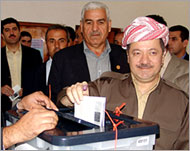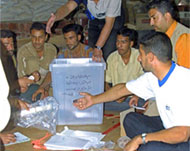Falluja witnesses day of peace
As 10 million Iraqis headed to the polls to vote on a constitutional referendum, the western city of Falluja experienced something it has not seen in more than two years – a full day of non-violence.

In April and October 2004, Falluja was a virtual battleground as US forces attempted to breach what they termed a stronghold of foreign fighters.
Much of the city was laid in ruin by the end of 2004.
But this did not keep the city’s residents from voting on Saturday.
Since the occupation of Iraq, Falluja has been a city that always carried the scent of gunpowder and blood in the air. It was the first city that fired at US-led forces, the first city to shoot down a helicopter and the first to expel American troops.
On the other hand, it was the first city to negotiate with the marines and reach a memorandum of understanding that was respected by both sides for six months.
So it came as a surprise to the outside world that Falluja would prove to be one of the most peaceful cities in Iraq on the day the future of the country was to be decided in a constitutional referendum.
January boycott
In the January polls, an overwhelming number of Iraq’s Sunnis boycotted the electoral process leading to a majority win of Shia and Kurdish legislators in the Iraqi parliament.
 |
|
January’s boycott led to a Shia |
According to Iraqi electoral commission figures, only 7000 Fallujans voted in that election.
To avoid repeating that mistake, Falluja’s Sunnis vowed to come out in force and make their voices heard.
“The more successful the political process is, the faster the (Americans) will leave,” said Falluja police chief Salah Khalil.
The scene in Falluja was unbelievably quiet.
Walking to vote
Just before 7am, when polling centres were due to open, people gathered in small groups, determined to walk with strength in numbers. The polling centre in their district was a 20-minute walk away.
The only question they asked each other was which armed force will guard the voting centres.
They were relieved to hear that it would be a local force comprised of Falluja police that would protect the voters and the polling stations.
On the way, discussion focused on explosions heard throughout Falluja the night before. The gunfire from fierce clashes had been heard overnight.
This quickly changed to talk of the sudden change of heart by the Iraqi Islamic Party which negotiated a last-minute deal with the Iraqi government and won eleventh hour amendments to the draft constitution.
But the people of Falluja viewed the Islamic Party’s decision with indignation because they claimed the last-minute negotiations fractured Muslim unity. Some in the crowd alleged the Islamic Party was trying to gain control of a ministry or two in return.
Fallujans vote no
US-led forces and Iraqi soldiers were scattered here and there on the way to the polling station.
At the entrance of the station stood members of the Falluja Police Unit and a group of young men with badges, apparently from the electoral commission.
 |
|
Fallujans overwhelmingly voted |
All Fallujans were expected to vote no to the constitution but one major hiccup was the colour of irremovable ink used to indicate that they had already voted.
“It stained our right hands,” one voter pointed out in a joking reprieve. “These are the hands we use to eat.
“This evening we will break our fasts by eating our inked ‘no’,” he joked.
As the group exited the polling stations, many Iraqi and foreign journalists asked why they had voted no to the constitution. They asked what other alternative there could be to the constitution.
No violence
Some voters said Islam was the only constitution and there was no need for imported documents.
Others adopted a nationalistic tone and said this constitution was a threat to the unity of Iraq and it was patched together rather hastily to satisfy US President George Bush’s domestic agenda and help him save face in the Iraqi scenario.
The Fallujans, having completed their national responsibility, walked back to their homes, greeting friends and neighbours along the way, sometimes standing to chat for a while trying to kill time before the sunset call to prayer indicating time to break the fast.
The day itself was remarkable for not a single bullet was fired in the city. And the people conducted themselves as if they had voted a hundred times before.
By Sunday afternoon, Iraq’s electoral commission said more than 189,000 Fallujans had cast their vote.